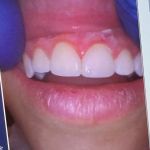Can Teeth Whitening Cause Sensitivity? Real Experiences and What You Should Know
- what-causes-teeth-sensitivity-after-whitening
- who-is-more-likely-to-experience-sensitivity
- real-people-real-stories
- how-to-prevent-and-manage-sensitivity
- safe-teeth-whitening-products-worth-trying
1. What Causes Teeth Sensitivity After Whitening?
It's a common concern—can teeth whitening cause sensitivity? The answer is yes, and here's why. Most whitening products use hydrogen peroxide or carbamide peroxide, which penetrate the enamel to break down stains. During this process, they can also irritate the nerves inside your teeth, leading to temporary sensitivity.
This sensitivity often feels like a sharp zap when consuming hot, cold, or sweet foods. It's usually temporary, but if you've ever felt it, you know how uncomfortable it can be.
According to Dr. Lisa Chang, a cosmetic dentist in Los Angeles, “The bleaching agents dehydrate the teeth slightly, which reduces the protective buffer and makes nerves more reactive to temperature.”
2. Who Is More Likely to Experience Sensitivity?
If you already deal with sensitive teeth, you're more likely to feel discomfort after whitening. Thin enamel, receding gums, or untreated cavities can also increase the risk. Overuse of whitening products—especially high-concentration strips or gels—can worsen the issue.
One thing to note: in-office whitening treatments, although more powerful, often include desensitizing agents that over-the-counter products don’t provide.
Age and Sensitivity
Younger people tend to have wider dentin tubules (the tiny channels in your teeth), making it easier for the bleaching agents to reach the nerves. That’s why younger users often report higher sensitivity levels.
Product Type Matters
Whitening strips, gels, and trays each have different effects. Strips may concentrate peroxide in a smaller area, causing more irritation. Custom trays from dentists can help distribute the gel evenly, reducing risk.
3. Real People, Real Stories
Take Amanda from Austin, Texas: “I used a popular whitening strip before my wedding. The results were amazing, but I couldn’t drink iced coffee without wincing for days.”
Or James, a college student in Boston: “I used a whitening gel from the drugstore. My teeth looked better, but I had shooting pains for a week. Now I only use products marked as safe for sensitive teeth.”
These stories show that while teeth whitening is effective, it can come with side effects if not used carefully.
4. How to Prevent and Manage Sensitivity
Before Whitening
Start using a toothpaste for sensitive teeth (like Sensodyne) about two weeks before your treatment. It helps block the pathways to nerves inside your teeth.
During Whitening
Follow product instructions carefully. Don’t exceed the recommended time, and avoid whitening every day. If pain begins, stop immediately and take a break.
After Whitening
Use fluoride mouthwash to help remineralize the enamel. Avoid acidic foods and extreme temperatures for 24 hours after treatment. Chewing gum with xylitol can also stimulate saliva flow, which protects enamel.
5. Safe Teeth Whitening Products Worth Trying
If you're worried about whether teeth whitening can cause sensitivity, you're not alone. The good news is there are plenty of products made with this in mind. Here are a few worth exploring:
Sensodyne Whitening Toothpaste
Gently lifts stains while protecting nerve endings—great for daily use.
Smile Brilliant's Custom Whitening Trays
Formulated for sensitive users and includes desensitizing gel.
Hismile PAP+ Whitening Kit
Uses a peroxide-free formula (PAP) designed to minimize sensitivity without sacrificing results.
Colgate Optic White Pro Series
A hydrogen peroxide-based product that's dentist-approved and includes enamel-safe ingredients.
So, can teeth whitening cause sensitivity? Yes—but it doesn’t have to. By choosing the right products and understanding your unique oral health, you can achieve a brighter smile without the pain.
Want to experience the benefits of a radiant smile without worrying about sensitivity? Click here to explore our recommended safe teeth whitening solutions and see what’s right for you.







 Liberty Oaks Dental Group4.0 (289 review)
Liberty Oaks Dental Group4.0 (289 review) John M. Chaves, DDS4.0 (142 review)
John M. Chaves, DDS4.0 (142 review) Genesis Dental of Magna4.0 (949 review)
Genesis Dental of Magna4.0 (949 review) McCall Family Dentistry5.0 (718 review)
McCall Family Dentistry5.0 (718 review) Graham Family Dental Care4.0 (93 review)
Graham Family Dental Care4.0 (93 review) Veil & Wild Orthodontics5.0 (103 review)
Veil & Wild Orthodontics5.0 (103 review) The Importance of Oral Health Education During Pregnancy for a Healthy Pregnancy
The Importance of Oral Health Education During Pregnancy for a Healthy Pregnancy Best Tips for Brushing Your Teeth Properly for Healthy Gums: Essential Techniques for Oral Health
Best Tips for Brushing Your Teeth Properly for Healthy Gums: Essential Techniques for Oral Health Why Skipping Dental Checkups Can Lead to Bigger Oral Health Problems
Why Skipping Dental Checkups Can Lead to Bigger Oral Health Problems Advantages of Porcelain Dental Restorations
Advantages of Porcelain Dental Restorations How Can Diabetes Cause Tooth and Gum Problems? Preventing and Managing Oral Health Issues
How Can Diabetes Cause Tooth and Gum Problems? Preventing and Managing Oral Health Issues Healthy Habits for Promoting Good Oral Health and Hygiene: Tips for a Healthy Smile
Healthy Habits for Promoting Good Oral Health and Hygiene: Tips for a Healthy Smile